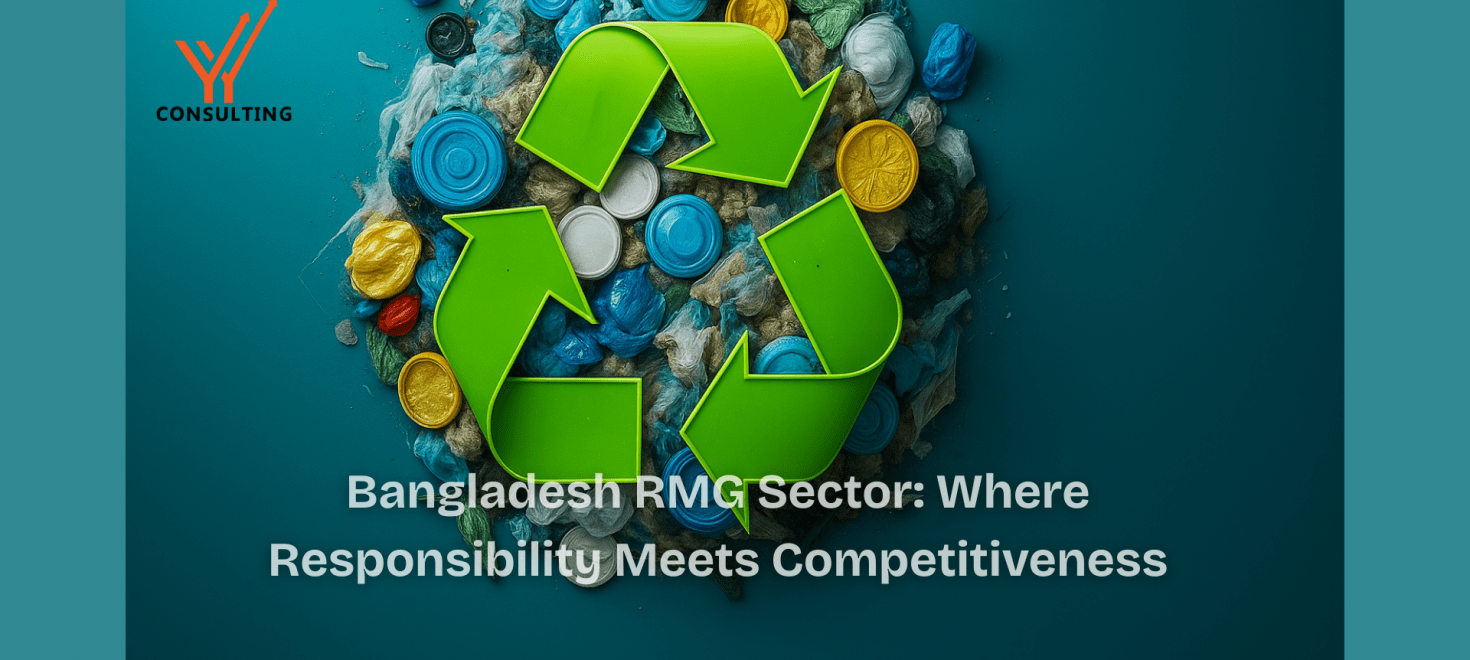When we speak about sustainability in apparel, the conversation often starts and ends with policy frameworks, certifications, and brand mandates. But in Bangladesh—the world’s second-largest exporter of garments—the real transformation is not happening in glossy reports. It is happening quietly, every day, on the shopfloor.
The challenge is no longer about why ESG (Environmental, Social, Governance) and circular economy practices matter; it is about how deeply they are embedded into daily operations. From recycling cutting scraps to empowering women on sewing lines, Bangladesh is slowly stitching sustainability into the very fabric of its manufacturing culture.
From Compliance to Competitiveness
Bangladesh’s apparel industry, born in the late 1970s, has grown into a global force employing over four million workers—most of them rural women. While it transformed the nation’s economy and society, the sector also faced criticism for its resource-heavy processes, labor issues, and raw material dependency. The Rana Plaza tragedy in 2013 triggered reforms, but sustainability has since expanded beyond safety into energy, waste, gender equity, and governance.
Today, ESG and circularity aren’t optional—they’re the new basis of competitiveness. Buyers demand them, regulators enforce them, and investors fund them. The factories that turn commitments into practice will define the next chapter of Bangladesh’s apparel story.
Waste No More: Closing the Loop
In Gazipur’s denim factories, cutting scraps once dumped or exported cheaply are now captured for recycling into new yarn. Through initiatives like the Circular Fashion Partnership, waste is being redefined as raw material.
Bangladesh produces over half a million tons of textile waste annually; recycling even part of it domestically could save up to US$700 million by reducing cotton imports. What was once a liability is becoming an asset.
This shift is cultural as much as technological—operators are trained to minimize and sort waste, and recycling is now a KPI. Companies like Recycle Raw and Broadway Regenerated Fiber are leading with mechanical and chemical solutions, building a circular economy that links factories, recyclers, and buyers into a system that could one day rival Europe’s.
From Workforce to Leadership
Bangladesh’s apparel sector employs over four million people, the majority women. For decades, they have powered production but remained absent from leadership. That dynamic is beginning to change.
Programs like GEAR (Gender Equality and Returns), supported by brands and NGOs, are multiplying these stories. Operators who once saw sewing as a dead-end job now see pathways to management. In a sector often criticized for labor exploitation, these daily changes are redefining what governance and inclusivity look like.
Beyond gender, ESG also calls for worker well-being: fair wages, social protection, maternity benefits, and grievance redressal mechanisms. These are not abstract social goals—they directly influence productivity, retention, and brand reputation. Factories that embed social responsibility in daily routines—from conducting health awareness sessions to ensuring daycare facilities—are discovering that empowered workers deliver stronger business results.
Green Is the New Competitive Edge
Bangladesh already leads the world in LEED-certified green garment factories, with over 200 certified units. These factories are not built for optics; they are engines of competitiveness.
Consider one LEED Platinum factory near Dhaka that invested in rainwater harvesting, rooftop solar, and advanced effluent treatment plants. Beyond cutting water usage by a third and lowering energy costs, these measures attracted buyers willing to commit to longer-term contracts. The message is clear: sustainability sells.
The global marketplace is also shifting. The EU Strategy for Sustainable and Circular Textiles and incoming due diligence laws in Europe and North America will require full ESG disclosure. Buyers are asking for carbon footprints, water consumption metrics, and waste recycling data as part of their sourcing decisions. For Bangladesh’s exporters, compliance will soon be less about brand audits and more about international law.
Factories that invest in energy efficiency, waste reduction, and transparent reporting today will have first-mover advantage tomorrow. Those that delay risk not just reputational harm but the loss of access to premium global markets.
DBL Group: A Case Study in Sustainability Leadership
About the Company
DBL Group is one of Bangladesh’s largest vertically integrated garment and textile manufacturers, supplying global brands like H&M, Puma, and Walmart. It has become a pioneer in sustainability, ESG integration, and circular economy practices within the country’s apparel sector.
Through its “Sustainability 5.0” framework, the company embeds ESG principles across people, processes, products, and the environment.
On circularity, DBL recycles pre-consumer textile waste into new yarns—cutting virgin material use by up to 60%. In collaboration with H&M, it blended recycled PET with cotton to produce over 164,000 garments, saving water, energy, and reducing CO₂ emissions. Its dyeing efficiency upgrades cut 3,000+ tons of CO₂, while its strong water management earned a “B-” in the CDP Water Report 2024, above the global average.
Social inclusion is equally central. With investments in healthcare, maternity support, and training, DBL ensures worker well-being. A recent US$52 million green loan is funding a new LEED-certified spinning mill, where over half the workforce will be women.
By aligning ESG and circular economy with daily operations, DBL has proven that sustainability is not only ethical but also a source of long-term competitiveness for Bangladesh’s apparel industry.
The Unfinished Agenda
Yet, the reality is more complex. The industry still faces a host of difficult challenges:
- Opaque waste chains that make recycling data hard to verify.
- Informal recycling hubs where workers remain vulnerable.
- Financing gaps that keep small and medium factories from adopting advanced technologies.
- Policy fragmentation where national frameworks on waste and sustainability remain piecemeal.
- Global buyer pressure that often outpaces local capabilities, leaving smaller units struggling to keep up.
In other words, policies and pilot projects are not enough. What Bangladesh needs is scale, transparency, and alignment—so that sustainability becomes as routine as a daily production meeting.
The Future Is Daily, Not Distant
The next phase of Bangladesh’s apparel story will not be written in boardrooms or international summits. It will be written in the mundane, everyday decisions:
- An operator choosing to segregate fabric waste instead of discarding it.
- A supervisor encouraging women to take on leadership roles.
- A factory owner investing in solar rooftops despite thinner margins.
- A buyer rewarding suppliers not just for speed and price but for their recycling metrics and social impact.
These actions may look small in isolation. But together, they represent a tectonic shift: from sustainability as compliance, to sustainability as culture.
As more factories digitize their operations—using dashboards, RFID, and blockchain for traceability—the integration of ESG into daily practice will become more visible and measurable. Buyers will not only receive finished garments but also live data on how sustainably those garments were produced.
Conclusion
Bangladesh’s apparel industry has always shown resilience—from Rana Plaza to global supply chain shocks—and today it has the chance not just to adapt, but to lead in ESG and circularity. The future of fashion will be defined by responsibility and resourcefulness, not just speed or low cost.
At Groyyo Consulting, we see this shift as an urgent necessity. Beyond diagnostics, we partner with factories to redesign processes, incorporate best practices, embed digital tools, and build resilient supply chains. From waste reduction and smart floors to gender inclusion and climate-conscious practices, we help manufacturers align sustainability with competitiveness.
Our work across Bangladesh, India, and Vietnam proves that the real differentiator is agility, credibility, and leadership in sustainability. With the right partnerships and innovation, Bangladesh can move from compliance to competitiveness—and Groyyo Consulting is proud to help lead that journey.

Divya Mohan
General Manager (International Business)
divyamohan@groyyo.com



Leave a Comment